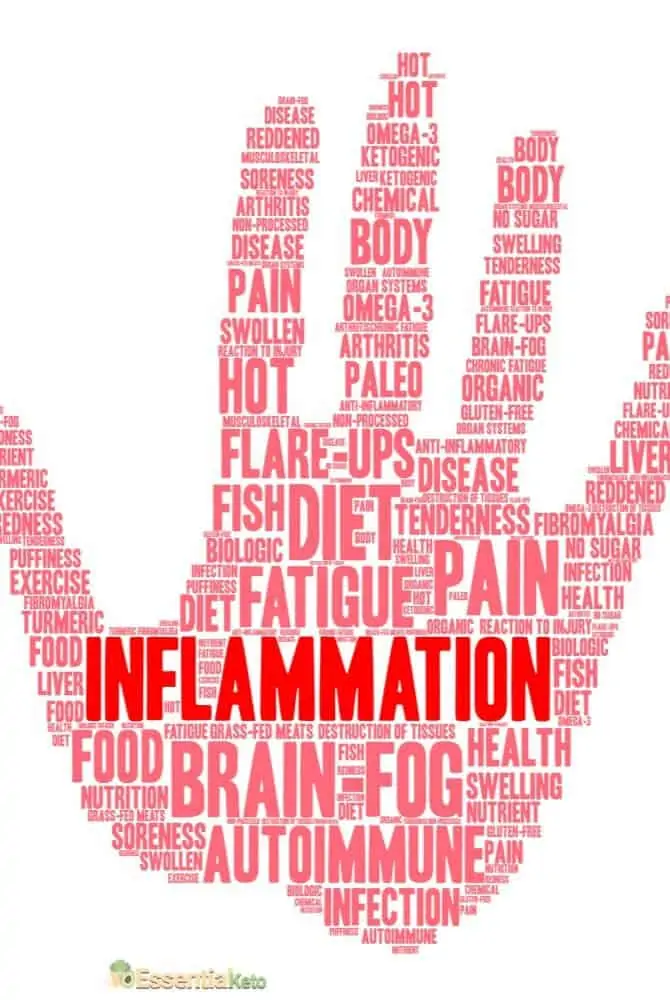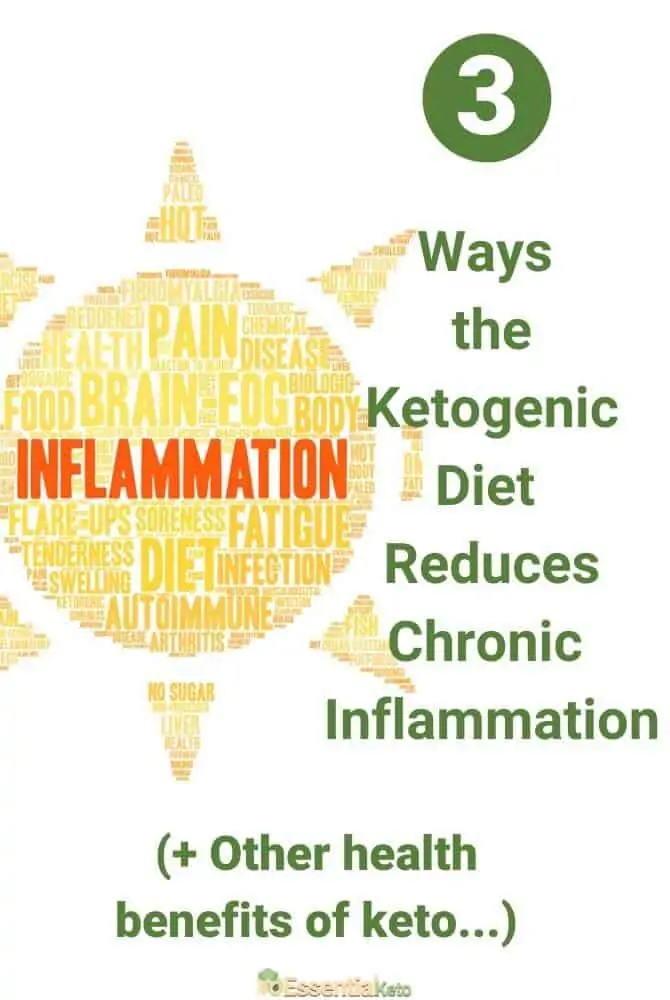How Keto Lowers Inflammation
Explanation of how the keto diet lowers chronic inflammation...

Acute inflammation in your body is not a problem. It has its place and fulfills an important function.
However!
When inflammation becomes chronic, then it can negatively effect your health.
There are ways to reduce inflammation, but the best way to manage inflammation in the body is to prevent it in the first place or to adjust your diet so that you can stop stoking the fire.
In this article today Shaun DMello explains how the keto diet lowers inflammation and then gives us his take on the other health benefits of a keto diet.
Over to Shaun...
To be clear, inflammation isn’t always a bad thing.
It’s a healthy response to injuries and infections. In those cases it’s described as acute inflammation.
Chronic inflammation is a serious concern however, as it refers to a persistent inflammatory state that lingers on after an injury has healed or infection has passed.
This kind of inflammation causes damage to tissues and organs over time, making you vulnerable to a wide range of serious health conditions.
It is linked to lifestyle diseases like diabetes, obesity, and cardiovascular disease, as well as conditions like arthritis, asthma, and mental health disorders.
Fortunately, there’s a lot that you can do to mitigate these risks.
Your diet is in fact the single most influential factor when it comes to controlling inflammation and the keto diet may be your best bet.
How the Keto Diet Lowers Inflammation
Here are a few of the ways how keto manages to reduce inflammation...
Produces fewer free radicals
Your body turns the carbohydrates you consume into glucose, which results in an increase in blood sugar levels.
Studies show that excess sugar in the blood stimulates the generation of free radicals that cause inflammation in various organs.
Free radicals also damage the cells lining the blood vessels, which increases their vulnerability to decay and pathogens.
While a high carb diet is associated with an increase in free radicals, a keto diet is linked to a decrease in free radicals.
This is because a keto diet is high in fats that are metabolized to form ketones – an alternative fuel to glucose.
Studies show that ketone metabolism produces fewer free radicals and can help to reduce inflammation and pain.
Increases the production of adenosine
Adenosine is a naturally occurring chemical that exists in all the cells in our bodies. It plays several key roles including promoting sleep and regulating blood flow to various organs.
However, in recent years, scientists have discovered that adenosine is also a potent anti-inflammatory agent as it regulates the function of inflammatory cells.
In the same study mentioned above researchers found that a ketolytic metabolism increases the level of adenosine, which is why a keto diet can help to reduce inflammation.
Similarly, GPR109A, a receptor for niacin is activated by specific ketones.
Under ketogenic conditions, this niacin receptor exhibits anti-inflammatory effects.
Suppresses activity of inflammatory genes
Recent research on the anti-inflammatory effects of a keto diet found that ketogenic diets “switch off” inflammatory genes.
The researchers found that a keto diet activates a protein called CtBP, which suppresses inflammatory genes.
This anti-inflammatory effect of ketosis explains the benefits of keto diets for some forms of epilepsy and other neurological illnesses.
A keto diet can also help to reduce brain inflammation that occurs after a stroke.
Findings from animal tests indicate that keto diets could even be beneficial for patients suffering from brain injuries, improving treatment outcomes and possibly extending lifespans.
This anti-inflammatory effect of a keto diet is not limited to brain-related inflammation. It can also help individuals with diabetes as this condition is associated with a pro-inflammatory state which increases the risk of atherosclerosis.

Other Health Benefits of a Keto Diet
Keto diets have been subjected to scrutiny and speculation over the years but scientific studies continue to prove the many health benefits of a ketogenic lifestyle.
The keto diet became popular due to its effectiveness in treating obesity and weight gain. Studies show that the keto diet is the most effective way to lose weight rapidly.
These quick results help people stay motivated so that they continue with their weight loss plan. A keto diet also helps to lower blood sugar levels and reduce belly fat.
Carbs have been linked to higher cholesterol levels, which is why a keto diet can help to reduce LDL (bad) cholesterol levels and triglycerides while simultaneously increasing HDL (good) cholesterol levels.
The keto diet also offers immense health benefits for those with diabetes. A diabetes study found that over 95% of the test participants who followed a keto diet reduced or even eliminated their glucose-lowering medications within 6 months.
In addition to getting started with the keto diet, you should also consider including more keto friendly foods that are known to exhibit anti-inflammatory effects in your diet.
Some noteworthy mentions include herbs and spices like turmeric, ginger, cinnamon, cloves, as well as fatty fish like salmon, leafy greens, and nuts like almonds and walnuts.
Author’s Bio: Shaun DMello is a prolific writer who has worked with a wide range of health and wellness brands for over a decade. His main areas of expertise are nutrition, fitness, natural medicine, public health, and health care technology. When he’s not writing, you can find him reading a good book, curled up on a recliner, jostling for space with his four cats.
Thank you Shaun! Now..
What's Next
If you want to live an optimal life and be pain free, you want to limit the inflammation in your body.
How can you do that?
Start with knowledge.
Shaun explains why keto helps to reduce inflammation above. When your friends tell you that a ketogenic diet is acidic and will cause more inflammation, you can refer them to this article.
Need more clarity, then read this article by Dr Mercola where he further discusses the above mentioned study about the ketogenic diet's effect on inflammation.
Set yourself up for success!
Get a keto meal plan that will work for you and commit 100% to changing your life!
Measure your progress.
Start by weighing yourself and monitoring your progress.
What do you do every day to ensure that you don't suffer the side effects of chronic inflammation? Please share with us in the comments below...

